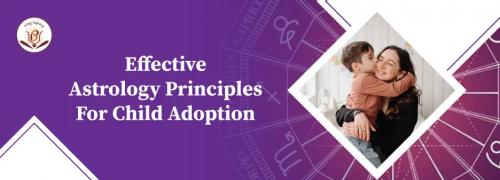Effective Astrology Principles For Child Adoption

Child adoption is an important decision that brings many changes to a couple's life. Astrology can help you understand the various aspects of child adoption based on the birth chart. It can provide answers as to whether it will be the right decision and what impact you can expect on your life and the child's life, as well as how well-crafted your relationship will be with your adopted child. If you want to know whether you should consider child adoption, you can click here to get the answer.
In Vedic astrology, the fifth house is considered the primary house related to progeny and children. We can get valuable information about child adoption through the fifth house analysis in the birth chart. Also, the D7 (Saptamsa) chart, a specialised chart for child adoption, is studied in tandem with the Lagna chart. Here, we will discuss important astrological combinations for child adoption and understand Mercury and Saturn's role as the neutral planets for childbirth.
The Role of the Fifth House in Child Adoption
In Vedic astrology, the fifth house in the birth chart signifies progeny, creativity, and children-related matters. This house provides information about happiness from children in an individual’s life. It also indicates whether the person will have his biological child and can also reflect the circumstances surrounding child adoption.
An astrologer analyses the planetary effects on the fifth house to determine whether a person will easily adopt a child or face challenges. This analysis can also reveal whether adoption would be the right decision and whether the person can have their biological child after adoption. The fifth house in the horoscope holds many secrets about childbirth and adoption. An astrological consultation can answer all your questions and provide the required solutions.
The Influence of Mercury and Saturn on the Fifth House
Mercury and Saturn are often considered neutral planets in Vedic astrology, so they are not naturally inclined to promote progeny directly. Their association with the fifth house can, therefore, be understood in specific ways:
Mercury's Influence: Mercury in the fifth house can make a person think logically and carefully about matters related to children. While Mercury itself isn't a planet that promotes having children, its presence in this house can lead someone to approach adoption with a lot of thought and planning. This might involve doing detailed research and considering all aspects of adoption and raising a child.
Saturn's Influence: Saturn is known for causing delays, restrictions, and the need for discipline. If Saturn is in the fifth house, it can suggest that having children, including for adoption, might take longer or face obstacles. This placement shows a serious and responsible approach to parenting, but it also means that adoption or having children may happen only after overcoming some significant challenges.
The D7 (Saptamsa) Chart
The D7, or Saptamsa, is a divisional chart related to progeny and children. The planetary combinations in this chart provide a microscopic view of the child's birth and adoption.
The Lagna and the fifth house in the Saptamsha chart are carefully analysed to understand an individual's childbirth and adoption. The negative influence of Saturn or Mercury in the D7 chart at the fifth house indicates challenges or obstacles in matters related to children. Saturn's negative influence could suggest delays, restrictions, or hardships associated with adoption. Mercury's negative influence might point to communication issues or misunderstandings regarding adoption decisions.
Fifth House Lord in the Ninth House
When the lord of the fifth house is placed in the ninth house, this combination is generally favourable for matters related to children and higher knowledge. The ninth house is associated with luck, dharma, and higher learning. This placement suggests that adopting a child will prove lucky for you.
Moon Under Malefic Influence
The Moon, representing emotions and nurturing, can significantly affect the adoption process when it is under malefic influence. Malefic influences on the Moon might lead to emotional challenges or complications in the adoption process. This placement indicates challenges related to emotional stability related to child adoption.
Saturn as the Fifth House Lord in the Fifth House
When Saturn, the lord of the fifth house, is positioned in the fifth house and associated with the Moon, it signifies a disciplined and responsible approach to child-related matters. Saturn's presence in its home reinforces a structured approach to parenting and adoption. However, the aspect from the Moon adds emotions, suggesting that the adoption process will involve both practical and emotional considerations.
Seventh House Lord in the Ascendant with an Aspect from Saturn or Mercury
When the 7th lord is placed in the first house and is influenced by Saturn or Mercury, the adoption process may be affected. Saturn's influence could indicate delays related to adoption. On the other hand, Mercury's influence may underscore the importance of communication and intellectual discussions about adoption with the partner.
Knowing When to Stop Trying for Biological Child and Planning for Adoption
Astrology can indicate when to stop trying for a biological child and instead start planning for adoption. The affliction of the fifth house in the birth chart indicates problems in natural childbirth. Now, if Karaka, i.e. Jupiter is also afflicted or weak in the birth chart, there are few chances of natural progeny. Also, the D-7 chart needs to be checked thoroughly. Depending upon the Dasha and the transits, an astrologer can suggest the time when one should start thinking of adoption, as there could be no hope for natural childbirth as indicated in the birth chart. However, sometimes, the couple conceives their natural child once they adopt one. If you want to know, will you have your biological child after adoption? You can click here.
Determining the Gender of a Child for Adoption
Astrological consultation can also suggest the gender of a child for adoption. Certain planetary combinations and house placements are seen to determine the gender of the adopted child.
For example, specific planets might indicate a harmonious match with a particular gender based on the individual’s Kundli. While astrology can provide valuable clues, it is essential to approach this aspect with an open mind.
Astrological analysis offers valuable insights into the complexities surrounding child adoption. The fifth house, central to matters of progeny and creativity, is crucial in understanding adoption prospects. The influence of Mercury and Saturn as sterile planets, along with the detailed examination of the D7 chart, provides a comprehensive view of the factors affecting adoption. Key combinations involving the placement of the fifth house lord, the Moon’s condition, and interactions between the seventh house lord and influential planets contribute to a nuanced understanding of child adoption.
Ultimately, while astrology can provide guidance, the decision to adopt is deeply personal and requires careful consideration, emotional readiness, and practical planning. It is important to recognise when to shift the focus from trying for biological children to planning for adoption and to consider the suitability of a child’s sex in alignment with personal and family dynamics.
Source: - https://www.vinaybajrangi.com/blog/effective-astrology-principles-for-child-adoption
Source: - https://www.vinaybajrangi.com/blog/effective-astrology-principles-for-child-adoption
Advertise on APSense
This advertising space is available.
Post Your Ad Here
Post Your Ad Here





Comments (1)
On Vent9
Mind Development Ventures
How many children do you have now?